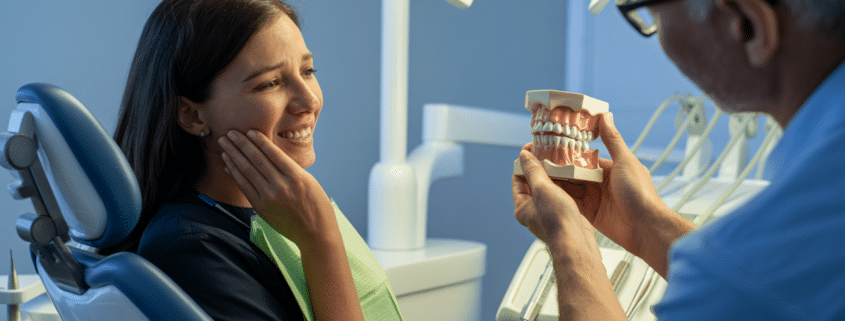Is Your Jaw Popping or Clicking? Understanding TMJ Disorders
Ever yawned or chewed and felt a pop in your jaw? Maybe it’s more of a click, or worse—chronic pain that radiates to your temples or neck. These aren’t random quirks; they could be signs of a TMJ disorder, a condition affecting millions that often flies under the radar.
TMJ (temporomandibular joint) disorders are more than just annoying sounds or jaw fatigue. Left unchecked, they can cause persistent pain, headaches, lockjaw, and even impact your ability to eat and speak comfortably. The good news? Dentists are uniquely equipped to diagnose and treat TMJ disorders, often with non-invasive methods that bring fast relief.
TLDR – Quick Guide
- TMJ Disorders: Affect the joint connecting your jawbone to your skull.
- Common Symptoms: Popping, clicking, pain while chewing, headaches, and jaw locking.
- Major Causes: Stress, teeth grinding, arthritis, jaw injuries, or misalignment.
- Treatment Options: Night guards, bite adjustments, physical therapy, or dental splints.
- Bottom Line: Early treatment leads to better outcomes—and less pain.
Detailed Breakdown
What is the TMJ, and What Can Go Wrong?
The temporomandibular joint acts like a sliding hinge that connects your lower jaw (mandible) to your skull. You use it constantly—for talking, chewing, yawning, and swallowing. When something goes wrong with this joint or the surrounding muscles, it’s called a TMJ disorder (TMD).
The National Institute of Dental and Craniofacial Research estimates that over 10 million Americans are affected by TMDs, yet many cases go undiagnosed or misdiagnosed.
Symptoms of TMJ Disorders
TMJ disorders can show up in subtle or severe ways. Common symptoms include:
- Clicking, popping, or grinding sounds when you move your jaw
- Jaw pain or soreness, especially in the morning
- Headaches or migraines
- Pain in the ear or around the temples
- Difficulty chewing or a tired feeling in the face
- Locking of the jaw (either open or closed)
- Pain or swelling on one or both sides of the face
It’s not always just the joint that’s affected—TMJ disorders can mimic other conditions like ear infections or tension headaches.
What Causes TMJ Disorders?
TMJ disorders have multiple potential triggers, including:
- Bruxism (Teeth Grinding or Clenching): Often unconscious, especially during sleep, this puts excessive pressure on the jaw joint.
- Arthritis: Both osteoarthritis and rheumatoid arthritis can damage the cartilage and bones in the TMJ.
- Injury or Trauma: A hit to the jaw or face can misalign the joint.
- Misaligned Bite: When your teeth don’t come together properly, the jaw has to compensate.
- Stress and Muscle Tension: Chronic jaw clenching due to stress is a major contributor.
Many patients have a combination of these factors, which is why personalized care is critical.
How Dentists Diagnose TMJ Disorders
Your dentist may:
- Ask About Your Symptoms: Including duration, triggers, and severity.
- Palpate the Joint and Muscles: To check for tenderness or abnormal movement.
- Listen for Sounds: Like popping or grinding while you open and close your mouth.
- Take Dental X-Rays or CT Scans: To assess bone structure and joint position.
- Evaluate Your Bite: Misalignment can often be the root cause.
Because there’s no single “TMJ test,” diagnosis relies on a combination of observation, imaging, and symptom tracking.
Effective Treatment Options
TMJ treatment varies depending on severity and cause. Fortunately, many patients find relief with non-invasive interventions:
- Custom Night Guards or Splints: Worn at night to reduce clenching and align the jaw.
- Physical Therapy: Exercises to strengthen and stretch jaw muscles.
- Bite Adjustments or Orthodontics: Correcting misaligned teeth or uneven bites.
- Stress Reduction Techniques: Meditation, counseling, or jaw relaxation exercises.
- Medications: Anti-inflammatories, muscle relaxants, or topical analgesics.
- Injections: In some cases, Botox is used to relieve overactive jaw muscles.
Surgery is rare and only recommended if all other treatments fail and the joint structure is severely damaged.
Key Takeaways
- TMJ disorders cause jaw pain, popping, and tension that can affect daily life.
- They’re commonly triggered by stress, bruxism, injuries, or bite misalignment.
- Dentists are trained to diagnose TMJ issues and offer personalized, non-invasive treatments.
- Early intervention reduces the risk of chronic pain or permanent joint damage.
- Ignoring jaw clicking might mean missing a critical health clue.
FAQs
Is jaw popping always a sign of a TMJ disorder?
Not necessarily. Occasional, painless popping may be harmless—but if it’s frequent or painful, it should be evaluated.
Can TMJ disorders go away on their own?
Mild cases sometimes improve with lifestyle changes, but chronic or painful TMJ should be treated by a dentist.
Will I need surgery for TMJ?
Surgery is rarely needed. Most people find relief with splints, bite therapy, and stress management.
How long does TMJ treatment take?
It depends on the cause and severity. Some patients improve within weeks; others need ongoing care.
Can I prevent TMJ disorders?
Managing stress, avoiding jaw overuse (like chewing gum), and treating teeth grinding early can help prevent issues.




Leave a Reply
Want to join the discussion?Feel free to contribute!